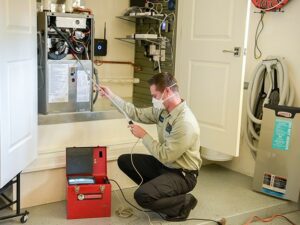It’s easy to forget the importance of heater tune-ups when your system seems to be operating normally. However, failing to be proactive in your heating’s upkeep can lead to unexpected breakdowns, safety hazards, and high energy bills. By scheduling regular tune-ups, homeowners in Bakersfield can enjoy reliable performance, energy efficiency, and other heater maintenance benefits.
The Importance of Regular Heater Maintenance
During winter, heating systems work harder to maintain warm and comfortable indoor temperatures. Without proper care, they accumulate dust, experience wear and tear, and struggle to maintain efficiency. Regular maintenance ensures optimal performance, preventing energy waste and premature breakdowns.

Safety and Reliability
Neglecting your heater affects more than performance — it can also create serious safety risks. Poorly maintained furnaces, heat pumps, and other systems may have increased risks of:
- Carbon monoxide leaks: A damaged heat exchanger in a furnace can allow harmful combustion gases to escape.
- Gas leaks: Damaged components may lead to gas leaks.
- Electrical and fire hazards: Loose or frayed wires can cause short circuits or fire risks.
- System breakdowns: Worn-out components may suddenly fail, leading to costly emergency repairs and leaving your home vulnerable to winter conditions.
Regular inspections and tune-ups identify and address these hazards, keeping your system running reliably throughout the winter.
Prevents Unexpected Breakdowns
Routine maintenance identifies and resolves regular wear and minor issues before they escalate into unexpected breakdowns and major repairs. Technicians check for subtle warning signs, such as rising energy bills or uneven temperature distribution, to find hidden problems. Catching these problems early helps save homeowners from costly emergency repairs and the discomfort of losing heat during cold or severe conditions.
Energy Efficiency
A well-maintained heating system operates at peak efficiency, reducing energy consumption and minimizing strain. When components are dirty or in poor condition, the system must work harder and use more energy to produce the same level of heat. Technicians adjust your system to minimize strain, and they can also offer energy-efficient heating tips for the winter.
Warranty Compliance
Many manufacturers require annual maintenance by a certified contractor to keep the warranty valid. Satisfying these warranty conditions protects you from paying out-of-pocket for repairs that otherwise fall under your warranty coverage.
How Often Should You Schedule Heater Maintenance?
Heating systems require servicing at least once per year, preferably in the fall before temperatures drop. This allows for necessary adjustments or repairs before the peak heating season when your system is under heavy use. Scheduling maintenance before winter optimizes it ahead of the colder months, reducing the risk of emergency repairs.
Some factors may necessitate more frequent maintenance, such as:
- Older systems experience more strain or wear.
- Households with high heating usage.
- Dander, dust, pet hair, and other airborne pollutants clog filters more quickly.
DIY vs. Professional Maintenance
Homeowners can maintain their heating system between professional services with these steps:
- Replacing filters every 30 to 90 days.
- Keeping vents open and unobstructed to promote proper airflow and duct pressure.
- Checking thermostat settings to ensure accurate temperature control.
Professional service, however, is necessary for in-depth system inspections, such as testing electrical components, cleaning burners, and identifying underlying problems. A trained technician can uncover issues that may go unnoticed during basic upkeep.
Key Benefits of Heater Tune-Ups
Regular heater maintenance provides numerous benefits, from improving energy efficiency to extending your heating system’s lifespan.
Improves Indoor Air Quality
A neglected heating system circulates dust, allergens, and pollutants throughout your home. Over time, clogged filters, dirty ductwork, and accumulated debris buildup on internal components contribute to degraded air quality, leading to respiratory issues or worsening allergies.
During tune-ups, technicians replace air filters to improve airflow and reduce airborne contaminants. They also check for mold or dust buildup in ductwork and inspect and clean blower components, burners, and other parts that impact air quality and circulation.
Prolongs System Lifespan
Regular maintenance minimizes wear, helping heating systems last longer. Without proper care, essential components deteriorate faster, leading to costly repairs or premature system replacements.
For instance, a well-maintained furnace may last 20 years, while a neglected unit may fail within 10 years or less due to excessive strain. Since replacing a heating system is a significant expense, routine maintenance helps homeowners extend their equipment’s operating life and maximize their investment.
Enhances Comfort
A well-maintained system delivers steady and reliable warmth throughout your home. Without cleaning and adjustments, your heating equipment may struggle with temperature fluctuations from rapid cycling, hot and cold spots from poor airflow, and other common comfort concerns.
Reduces Energy Costs
Heating your home is important, but it accounts for a significant portion of your energy bill, and a poorly maintained system may cause these costs to spike unnecessarily. A tune-up keeps your heater operating at peak efficiency, reducing the amount of fuel or electricity required to warm your home evenly.

Common Heating Problems Prevented by Regular Maintenance
Many heating issues stem from insufficient maintenance. Here are a few ways that tune-ups prevent common heating problems in the winter.
Weak or Uneven Heating
Weak heating can result from a faulty thermostat or malfunctioning burners. Restricted airflow, often from clogged filters, blower fan problems, or ductwork damage, can cause cold spots throughout your home.
Strange Noises
Heating systems should run quietly. Unusual or persistent sounds may indicate various underlying problems, such as delayed ignition, loose screws or components, or a failing blower motor.
Short Cycling
Most systems cycle on several times per hour, with heating cycles lasting 10 to 15 minutes. Short cycling refers to when your heating turns on and off more quickly than it should, resulting in brief periods of heating that may waste energy and fail to sufficiently warm your home. Many underlying factors may contribute to short cycling, such as:
- Restricted airflow, causing overheating and triggering safety shutdowns.
- Miscalibration or faulty sensors in a thermostat, resulting in inaccurate signals to the heater.
- Dirty or faulty flame sensors that shut off the burner before completing a full cycle.
Trust Monarch for Heating Maintenance in Bakersfield
The cost of heater maintenance is an important investment in the safety and efficiency of your system. Don’t wait for a breakdown — contact us at Monarch Home Services today to schedule heater maintenance and enjoy reliable warmth all winter long.


